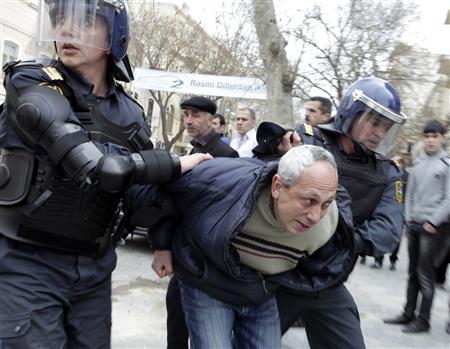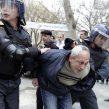
Azerbaijani Opposition Unsuccessfully Attempts To Copy Arab Revolutions
Publication: Eurasia Daily Monitor Volume: 8 Issue: 66
By:

In an attempt to copy the Tunisian and Egyptian revolutions, the Azerbaijani opposition organized a street demonstration in Baku on April 2. Despite the government prohibition of this event and the offer by the Mayor’s office to hold the rally in another location, the organizers –The Public Chamber– a union of several opposition parties, decided to conduct the event in Fountain Square in the city center. Several hundred opposition activists gathered in the square to shout anti-government slogans. They were quickly detained by the police forces and the whole rally was dispersed within several minutes (APA News Agency, April 2). The detained demonstrators (police officially announced 70 persons) were later released.
The joint press release of the Ministry of Internal Affairs and Prosecutors Office stated that the number of protestors was 350 and that as a result of the clashes between police and protestors 25 police cars, 17 shops, and one bank were damaged, while13 policemen were wounded.
The event raised many expectations, but few of them materialized. It was shocking to see that the union of all major opposition parties could put together such a small group of protestors to rally against the government. A few days before the event, the opposition daily Yeni Musavat proclaimed, “The wave of Arab revolution starts in Azerbaijan.” Other opposition activists speculated that the event would be the largest anti-government rally in the history of the Azeri government. The results for them were disappointing. Not only did people not attend the event, they seemed to be unaware of it just a few blocks away from Fountain Square. The city continued with its normal life. Interestingly, the leaders of the opposition parties (Ali Kerimli and Isa Gambar) did not even appear in the square.
Former Member of Parliament, Anar Mammadkhanov, known for his close ties to President Ilham Aliyev, commented on this failure of the opposition, “For some time I have been hearing that the opposition will organize a grandiose rally, which would shake the country. But nothing like that happened, because our opposition cannot even organize a wedding, yet alone a street rally. For 18 to 20 years we see the same leaders in the opposition and we know their quality” (www.1news.az, April 2).
Indeed, the April 2 event looked more like a timid and uncreative attempt to copy the Arab revolutions than a sincere and genuine plan to force real change in the country. Some analysts believe that the opposition organized the rally in order to boost their image for the benefit of their members. Without any attempts to topple the government, the opposition leaders will loose credibility and funding both inside and outside the country. The protest rally appeared to be carried out for the sake of publicity, and without any genuine intentions.
Siyavush Novruzov, deputy executive secretary of the ruling Yeni Azerbaijan party, accused the opposition forces of trying to create chaos and confusion in the country: “One can say that this activity of the opposition is aimed at ruining stability in Azerbaijan and is funded by foreign political circles, going against the national interests of our country” (Azerbaijan newspaper, April 2).
The Association of NGOs in Azerbaijan also criticized the event. Rauf Zeyni, the head of the association, which unites some 500 NGOs, said that the majority of NGOs do not support the radical opposition. “We ask the opposition parties not to involve us in their political agenda,” said Zeyni in an interview with 1news.az.
Despite this failure, the organizers of the event considered it a success. “The power of the ruling party could not stop the opposition. The Public Chamber was able to conduct its planned action,” Yeni Musavat claimed on April 3.
Meanwhile, an analyst in the Center for Strategic Studies, Rauf Garagozov, published a report on April 1 claiming that the rapid economic and social development in Azerbaijan has resulted in a decline in the number of opposition supporters: “Our research shows that the improving welfare in the country and the recent aggressive campaign against corruption in the country lowered the social base of the opposition.” Garagozov concluded that the center has prepared a new report for the government on support for the middle class, which will lead to greater social stability in Azerbaijan (www.1news.az, April 1).




